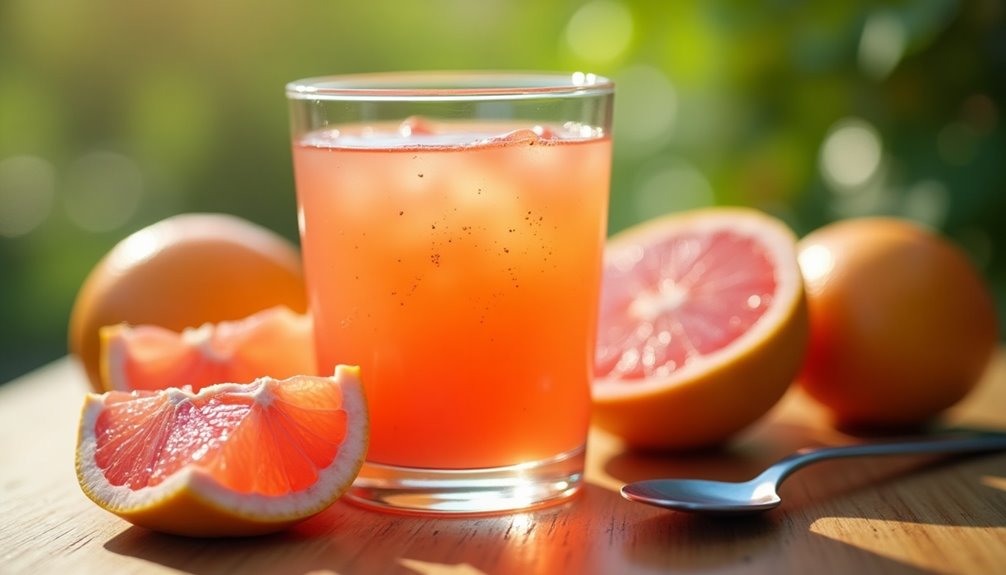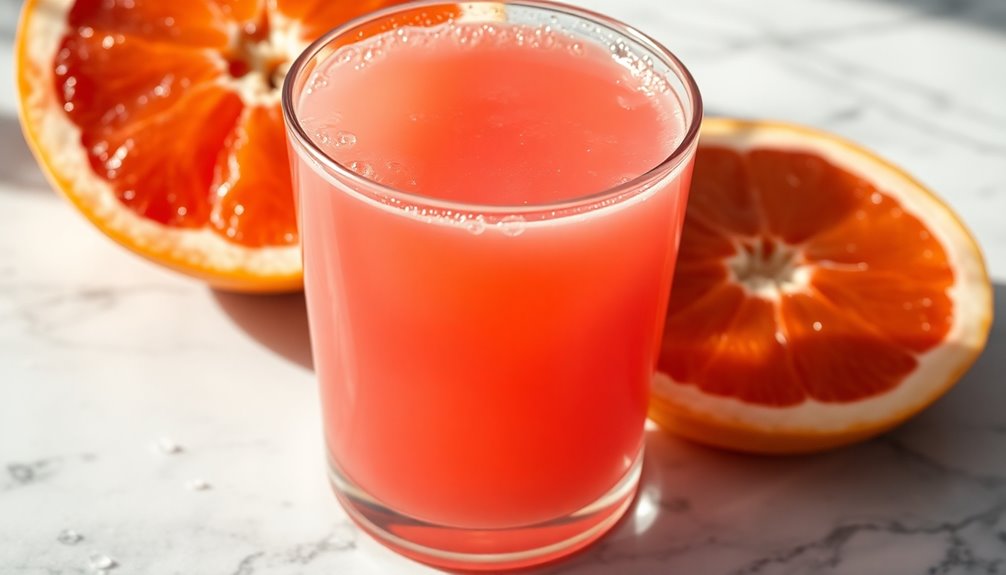Grapefruit juice contains about 22 grams of natural sugar per cup. This sugar comes from the fruit itself, so there are no added sugars to worry about. With around 96 calories per serving, it's a refreshing drink that offers health benefits without the guilt. Plus, it's low in sodium, making it suitable for those watching their intake. If you want to discover more about its nutritional benefits and overall appeal, just keep exploring!
Key Takeaways
- One cup of grapefruit juice contains approximately 22 grams of natural sugar.
- The total carbohydrate content in grapefruit juice is also 22 grams.
- No added sugars are present in grapefruit juice, making it a healthier choice.
- Grapefruit juice's high sugar content comes from natural sugars in the fruit.
- It is a nutrient-dense beverage, providing health benefits alongside its natural sweetness.

Have you ever wondered how much sugar is in grapefruit juice? If you're a fan of citrus drinks, you might've a few questions about its sugar content, especially when you're trying to make healthier choices. Grapefruit juice is a refreshing beverage, but understanding its sugar levels can help you decide if it fits into your diet.
In one cup of grapefruit juice, you’ll find approximately 22 grams of sugar. This amount makes up the total carbohydrate content of the juice, which is also 22 grams. It’s important to note that the sugar in grapefruit juice primarily comes from natural sugars. Unlike many fruit juices on the market, grapefruit juice doesn’t contain added sugar, so you can enjoy its natural sweetness without worrying about extra sweeteners. This makes it a healthier beverage option compared to many other juices that are loaded with both natural and added sugars. Moreover, the unique flavor profile of grapefruit juice can complement a variety of cocktails, smoothies, or even culinary dishes, adding a refreshing twist. If you’re looking for ways to adjust the sweetness level of your drinks, you might wonder how to sweeten grape juice without masking its natural flavor. By using a touch of honey or agave syrup, you can achieve a delightful balance while retaining the juice’s inherent taste.
When you're considering your options, keep in mind that grapefruit juice is also low in calories. A typical serving of grapefruit juice has around 96 calories. While the sugar content may seem high, the absence of added sugars and the low-calorie count means you can enjoy it without feeling guilty. It's a great way to hydrate and indulge in something delicious at the same time.
Beyond its sugar and calorie content, grapefruit juice is packed with vitamin C. In fact, just one cup provides around 80% of the Daily Value (DV) for this essential nutrient. Vitamin C is vital for your immune system and overall health, so drinking grapefruit juice not only satisfies your taste buds but also supports your well-being.
The natural sugars in grapefruit juice contribute to its refreshing taste, making it a favorite among citrus lovers. If you're looking for a drink that feels indulgent while still being relatively healthy, grapefruit juice checks those boxes. Its low sodium content—only 2 milligrams per cup—further solidifies its status as a healthier beverage choice.
When you sip on grapefruit juice, you're not just enjoying a flavorful drink; you're also getting a boost of nutrients that can benefit your body. With its natural sugars and vitamin C content, it stands out among other beverages that might be higher in calories and less nutritious.
Frequently Asked Questions
Does Grapefruit Juice Have a Lot of Sugar in It?
You might wonder if grapefruit juice has a lot of sugar in it.
While it does contain a fair amount of sugar, most of it comes naturally from the fruit itself, not from added sweeteners.
In fact, about 92% of the calories in grapefruit juice are from carbohydrates, primarily sugars.
Is Grapefruit Juice Good for Diabetics?
You might wonder if grapefruit juice is a healthy choice for diabetics. While it's packed with vitamin C and potassium, its sugar content could be a concern.
The glycemic index is relatively low, which helps with blood sugar control, but portion sizes matter.
Always consult your healthcare provider before adding it to your diet, as it can interact with certain medications.
Moderation is key to enjoying its benefits without risking your blood sugar levels.
What Has Less Sugar Grapefruit Juice or Orange Juice?
When you compare grapefruit juice and orange juice, you'll find grapefruit juice has slightly less sugar.
In an 8 fl oz serving, grapefruit juice contains about 21 grams of sugar, while orange juice typically has around 22 grams.
If you're watching your sugar intake, grapefruit juice might be the better choice for you.
Plus, it still packs a nutritious punch with vitamin C and other beneficial nutrients, making it a healthy option.
Is Grapefruit Juice Good or Bad for You?
You might worry that grapefruit juice isn't healthy due to its sugar content, but it's actually packed with benefits.
It's low in calories, rich in vitamin C, and provides potassium, which supports heart health.
Plus, its refreshing taste can be a great addition to your diet.
Just remember, if you're on certain medications, it's wise to check with your healthcare provider first.
Conclusion
In the world of citrus, grapefruit juice stands as a vibrant sun, illuminating your health journey. While it does contain sugar—about 8-10 grams per cup—its tangy essence offers more than just sweetness. Like a refreshing breeze on a warm day, it brings essential vitamins and antioxidants to your table. So, savor each sip, knowing you're not just indulging in a tasty drink, but also embracing the many benefits that come with it. Cheers to that!
Cindy thoroughly researches juicing trends, techniques, and recipes to provide readers with practical advice and inspiration. Her writing style is accessible, engaging, and designed to make complex concepts easy to understand. Cindy’s dedication to promoting the advantages of juicing shines through her work, empowering readers to make positive changes in their lives through the simple act of juicing.











